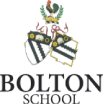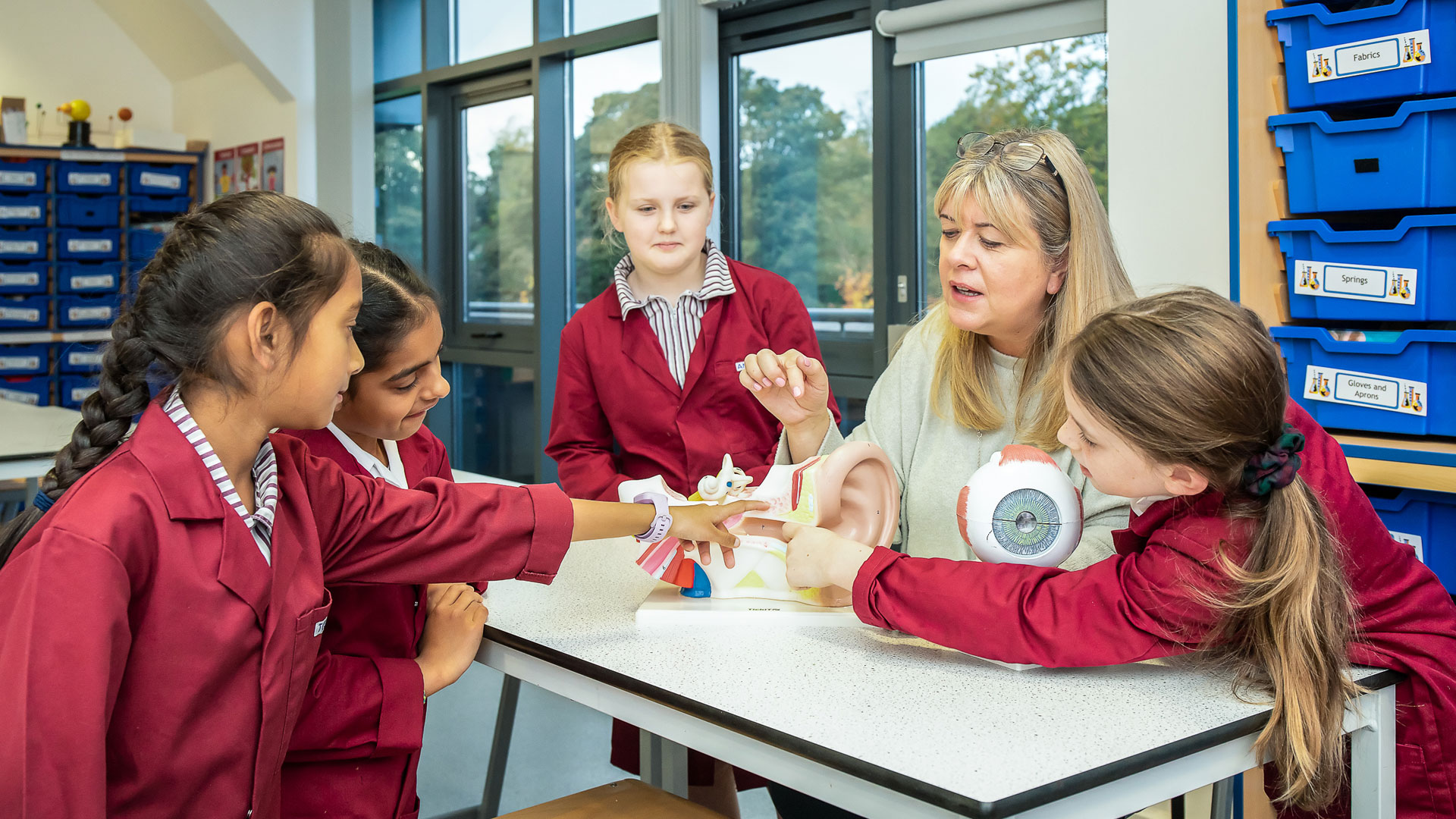
In the Junior Girls' School it is our aim to ensure that every member of the school community feels valued and respected and that each person is treated fairly and well. For example, a playground buddy system helps to ensure that all children enjoy a happy playtime. We praise and reward children for good behaviour and work in a variety of ways:
The children are divided into five houses based around the theme of 'The Lake District'. Every month there is a house meeting and a cup is awarded to the house with the most points. There is also an individual cup for the person who has gained the most house points. House points are awarded for excellent work, effort and courteousness.
Merits are awarded either for consistent good work or behaviour or to acknowledge outstanding effort or acts of kindness in school.
A special weekly assembly celebrates children's achievements from both home and school. Recent achievements include participating at The Horse of The Year Show, selection for the British Gymnastics Tournament and representing Bolton in the National Schools' Chess Tournament.
The quality of pupils' personal development is excellent.
ISI Inspection
The pastoral care is excellent at all stages within the school, and relationships between pupils and staff are strongly positive.
ISI Inspection
I really like achievements assembly because I get to know what people do out of school.
Helena, Y5
We are very fortunate to be able to provide a full time medical service throughout the school term. The school employs a fully qualified registered nurse thereby ensuring that there is always medical cover for the school.
She provides a holistic service to our pupils, working with parents and teaching staff as a partnership. This should ensure that the pupil's educational, physical and emotional needs are fully met. Regular health assessments take place throughout each pupil's time in the Junior School. Any medication brought into school is kept and administered by the nurse.
The nurse takes an active role in the teaching of PSHE (Personal, Social and Health Education), including personal hygiene and health issues in Year 5.
The nurse helps you with any illness. If you hurt yourself badly, if you have been sick or if you just have a headache they will have the cure.
Gowree, Y6
Junior Boys
Children learn best when they feel safe, happy and valued and that is what lies at the heart of all that we do at the Junior Boys’ School.
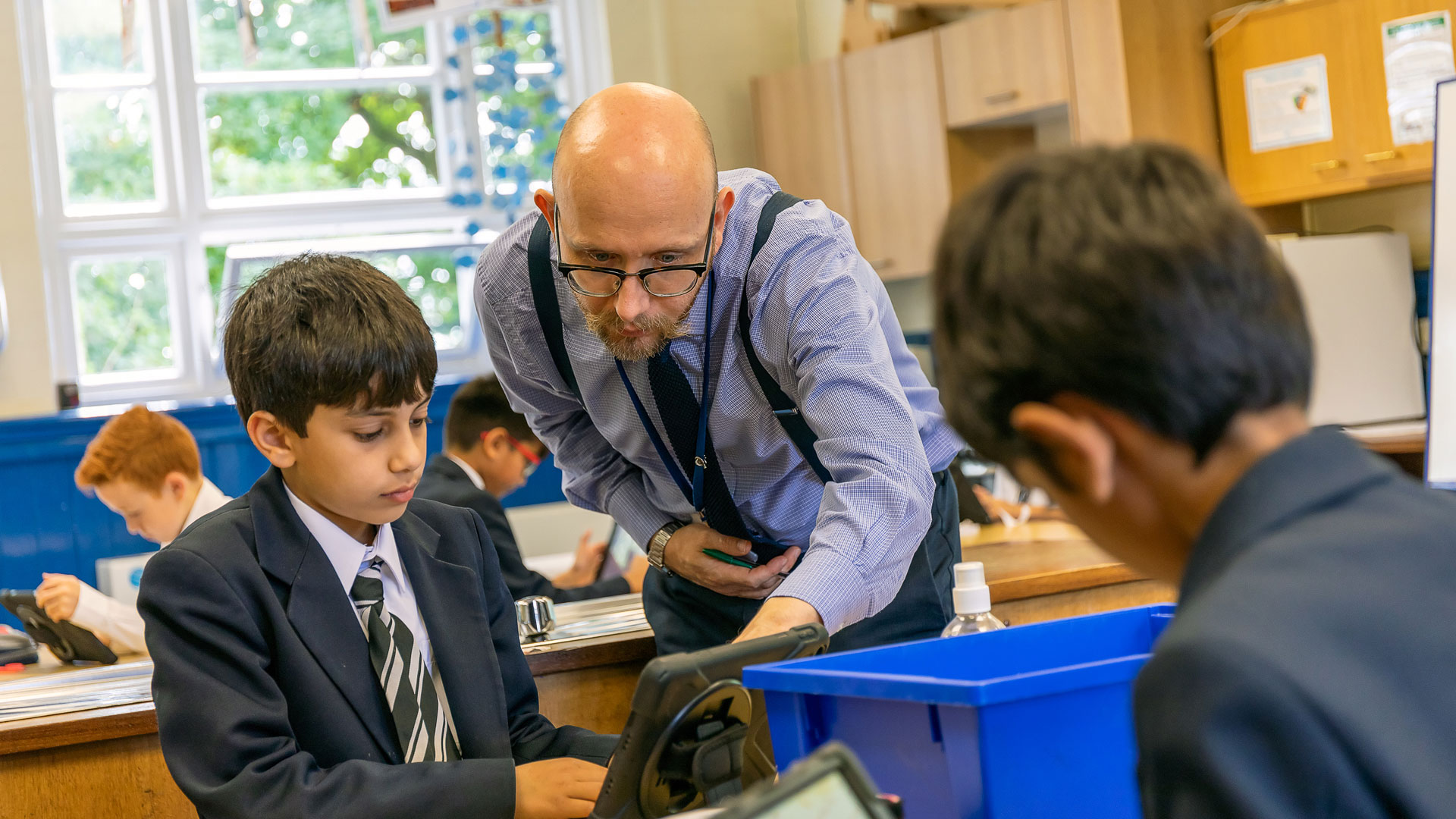
- Create a safe and happy environment in which pupils feel valued and respected and respect and value each other
- Promote in our pupils the self-awareness and self-confidence they will need to embrace the opportunities and challenges they will face
- Promote a sense of reflection upon and accountability for one’s own behaviour
- Support our pupils as they learn to develop positive relationships
- Challenge pupils to try new things, raise their aspirations and do their best in order to achieve their potential
The boys value having very clear guidelines of the behaviour we expect from them and are encouraged to treat others as they would wish to be treated. The Form Teacher is the person of central importance in the life of any single pupil, offering friendship and support as well as presenting a clear disciplinary response when necessary.
All teaching staff emphasise a positive attitude to work and other individuals, offering encouragement when a pupil has performed well or has worked especially hard with achievements rewarded and celebrated through systems such as House points or merits and achievement certificates or letters home.
In addition to the teaching staff, our Health and Wellbeing Assistant is also on hand every day to support the boys in whatever way they need. Whether that is to clean a grazed knee, help with friendship difficulties or even offer support at a time of family bereavement, Miss Christian plays a central role in helping the boys through whatever ups and downs their day may bring.
Of course, our pupils’ wellbeing and happiness, relies on a strong partnership with parents so that we can work together to support our children in achieving their success. We welcome and encourage good communication links with school and our developing programme of parental support reinforces this.
At Park Road we support our pupils through any challenges, disappointments or worries they may have to face. The care we provide means that they leave us as resilient, confident and independent young people.
Girls' Division
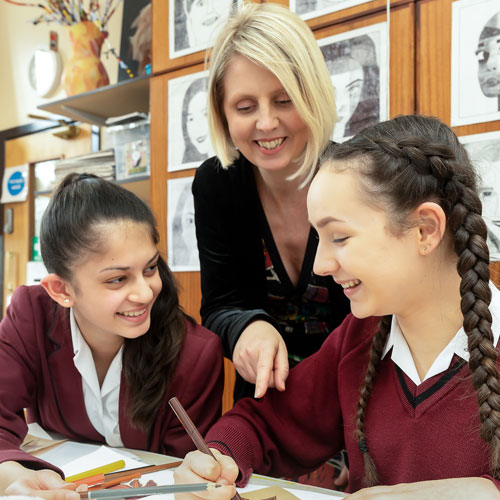
Coming to a new school is a big step. It can seem very daunting when you do not know anyone else in the year group. We know that this can be a time when our students need reassurance and encouragement and we do everything we can to help them settle in happily. Our primary concern is to ensure the wellbeing and progress of each individual.
Within the Senior School, pastoral care is the responsibility of a dedicated team which comprises the Deputy Head (Pastoral), three Heads of School, Heads of Year, Form Tutors, Pastoral Supervisors, the SENDCo, the School Nurse and School Counsellor. They monitor each student's progress in all aspects of school life, providing guidance, encouragement and support. We have our own dedicated pastoral hub, The Hive, where students are able to access both academic support and well-being support. A vast range of activities take place in The Hive, from reading buddies, mentor support and learning support, to support groups, bereavement sessions and counselling. Behaviour at Bolton School is excellent and we encourage all our pupils to treat each other with respect, courtesy and consideration.
Form Tutors take responsibility for the pastoral care of the girls, ensuring closer monitoring of their development. Each Form Tutor is responsible for morning and afternoon registration, as well as for delivering the Thrive (PSHE) sessions every fortnight for his or her group.
View the 2023-24 PSHE schedule here.
The Year Tutor supports the Form Tutors and organises year-based activities. The Year Tutors are:
- Year 7: Mrs James
- Year 8: Mr McBride
- Year 9: Mrs Walters
- Year 10: Miss Langley
- Year 11: Mrs Naughton
- Year 12: Mrs Delves
- Year 13: Mr Winrow.
The Head of School is in charge of the academic and pastoral life of each section of the school.
- Head of the Lower School (Years 7 to 9): Ms Noot
- Head of the Upper School (Years 10 and 11): Ms Teichman
- Head of Sixth Form (Years 12 and 13): Miss Gunshon
Parents wishing to discuss an issue concerning their daughter's well being at school should always contact the Head of School in the first instance.
We see the Sixth Form as a transitional period of the education process, and so our pastoral care is tailored to successfully guiding the students through their final two years in school, while at the same time preparing them for life beyond Bolton.
Sixth Formers are members of small tutor groups (10-12 students) and meet their tutor each morning. The relationship with the tutor is a most important one, as they are on hand to guide the student through the start of post 16 study, onto the intricacies of university application, while keeping an eye on potential career options. The tutor meets regularly with the Head of Year, who in turn keeps the Head of Sixth Form up to date with students’ progress.
We recognise that the transition to Sixth Form life and then university can be a challenging time. In consequence, our pastoral care system, based on close tutorial relationships, is geared to ensure each student’s academic and personal wellbeing. We also have two dedicated Pastoral Supervisors who are on hand to support students.
Sixth Form students play an important leadership role in the rest of the School as prefects, members of School Council, Form Captains and Sports Captains.
Pupils are self-assured, purposeful and mutually supportive" and "they readily accept responsibility and assume a variety of leadership roles.
Pastoral care was found to be excellent at all stages within the School and relationships between pupils and staff were seen as strongly positive.
ISI Inspection
The partnership between home and school is very important to us and we positively encourage good communication between parents and teachers.
There are four points of contact for most year groups. These events are distributed across the year so that there is at least one in each term:
- You will be invited to the Consultation Evening when you and your daughter will have the opportunity to discuss her progress with individual members of staff.
- The year group Information Evenings are for parents only. On these occasions the Head and key teaching staff talk about those aspects of school which are relevant to that particular year group and answer any general questions you may have.
- Interim reports offer a snapshot of your daughter's progress with attainment grades recorded for all subjects.
- The annual full report is a longer, more detailed summary which identifies strengths and highlights areas for development.
We actively encourage you to contact the school at any time should you have concerns about any aspect of your daughter's education or wellbeing. You are always welcome to let us know of any problems by making an appointment to see the Head of School (in the first instance) or (for more serious or long term matters) the Head at a mutually convenient time.
We are very fortunate to have a fully qualified School Nurse who deals with any medical matters which occur during the school day from 8.30am-4.30pm.
She also maintains pupils' medical records and is in regular consultation with Heads of School to discuss medical issues. During the day the Nurse also looks after any medication that your daughter may need to take, apart from asthma inhalers.
Our very successful PSHE programme, Thrive, highlights issues relating to health at regular intervals following consultation with the School Nurse. In recent years the programme has included sessions on drugs awareness, smoking, alcohol, healthy eating and, for the Sixth Form, women's health issues. These sessions are often delivered by outside speakers who are experts in their particular field.
We recognise the importance for students to have access to counselling professional emotional support when needed. Helen, a counsellor for Young People, is available to meet with students each Tuesday and Thursday. Appointments can be arranged by requesting an appointment via any of the Pastoral team.
Social, Moral, Spiritual and Cultural Education (SMSC) is an increasingly important aspect of the curriculum. Topics such as Human Rights, the Democratic Process and Equal Opportunities are covered as part of our Personal, Social and Health Education programme, Thrive, which is taught through discrete, fortnightly timetabled lessons.
A number of aspects of SMSC are taught within subject lessons. For example, the Religious Studies department, in delivering Religion and Philosophy lessons to Year 10 and 11, deals with issues such as rights, justice, punishment, and respect and understanding of identity in a multi-cultural society.
Elements of SMSC are also delivered through assemblies, the School Council, the Duke of Edinburgh's Award, Community Service, Charities, Careers Education, the Literary and Debating Society and Exchange visits.
Students make an outstanding contribution to the local community.
ISI Inspection
The School Council, a body elected and run by the girls themselves, meets twice a term to discuss ideas and concerns under the guidance of the Deputy Head (Pastoral). Forty-two girls, representing the views of every Form in the school, sit on the Council which is chaired by the Head Girl. Items for the agenda come mainly from the girls although sometimes staff may ask for a proposal to be discussed. The Council's recommendations are discussed with the Head and Staff.
The Council is a valuable way for students to take responsibility for their role within the Bolton School community.
Finance for the day-to-day running of the Council and for special projects is provided by The Parents' Association; we are grateful for their support.
Boys' Division
Our approach to Pastoral Care is very simple: we are dedicated to promoting the happiness and wellbeing of every student. Our pastoral care is excellent because we forge positive partnerships with parents and boys to nurture the academic and personal potential in every boy.
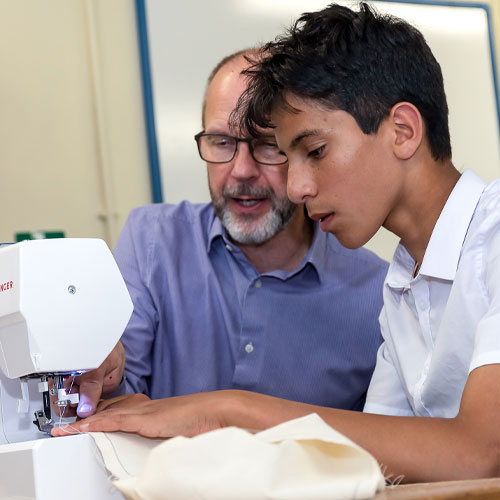
Our approach to safeguarding is student-centred: when our young men feel safe and supported, they thrive. It is our aim that students leave the school as self-confident young people equipped with the knowledge, skills and attributes that will allow them to lead a happy and fulfilled life and to make a difference for the good in the wider community. We aim to achieve this by fostering a learning environment that provides challenge, encourages initiative, promotes teamwork and develops leadership capabilities.
We celebrate the rich diversity of our multi-cultural school community. Our boys develop strong, moral characters that recognise the rights of others within the school, which include: the right to learn; the right to teach; to be treated with respect, tolerance and fairness; to be listened to and share views; to be safe and happy; to be helped and supported.
We believe that clear, consistent and proportionate sanctions and rewards are essential for promoting positive behaviour and they support the boys’ feelings of security. We take a zero tolerance stance towards all forms of bullying and proactively tackle it through our Anti-Bullying Strategy, which we promote to boys and their parents. Our pastoral care is effective because it anticipates potential barriers to learning and upskills students to overcome them and become independent learners. We recognise that academic attainment is intrinsically linked to the successful acquisition of personal qualities such as self-discipline, confidence, resilience, empathy, individual responsibility and an understanding of the students’ roles within our School, local and national communities. As an excellent Independent School, we facilitate the acquisition of these attributes through embedding a behaviour for learning ethos in the school, offering a challenging pastoral programme and through a broad, high quality and inclusive extra-curricular programme that includes the monitoring of every boy’s level of engagement. We quality assure that Pastoral Schemes of Work are tailored to each year group and provide inspiring lessons on topics such as: body image, cyber-safety, healthy relationships, hate crime, British values, domestic violence within the context of teen age relationships, mental health awareness, personal organisation and mindfulness.
We have designed a challenging, ambitious and inclusive curriculum that reflects the diversity of our school and prepares all of our students to: participate actively; develop self-confidence; to grow in self-awareness; and to make positive contributions as global citizens in the 21st Century.
The aims of our Pastoral Curriculum are to:
- Provide clear and reliable information for students.
- Provide students with the skills and attributes to lead happy and fulfilled lives.
- To encourage personal responsibility in all forms of behaviour and equip students with the skills necessary to make informed choices.
- To reduce anxiety, encourage self-esteem and promote wellbeing.
- To encourage respect and consideration for others.
Our Pastoral Curriculum has been designed in consultation with Pupil, Parent and Staff voice and teaching materials have been curated to ensure they are research based, engaging and appropriate for our context. The programme includes Relationships and Sex Education (RSE), P.S.H.E, S.M.S.C. and our own Bolton School Character Education programme.
Character education is central to our ethos. At Bolton School we value, model and promote specific character traits. These are: determination, having a positive mindset, personal organisation, self- control, good conduct, empathy and intellectual curiosity. By developing these traits, we encourage boys to flourish and meet future challenges so they are better able to fulfil their potential and contribute meaningfully to society. The traits are introduced in Year 7 and boys reflect on them throughout their school career, developing them in many areas of school life including on the sports field, through drama and music, as part of active civic service, through House and charitable activities and at Patterdale Hall.
Topics are delivered by Form Tutors, Heads of Year and visiting speakers through assemblies, designated form tutor Pastoral Periods and SPACE. A full schedule of topics and when they will be taught is available on request from the Head of Year.
The Home-School partnership is essential for supporting boys on their educational journey; we encourage parents to reinforce the work of the pastoral curriculum through invitations to attend workshops and presentations in the ‘Teenage Journey’ lecture series. The Parents’ Association play a significant role in the organisation and promotion of these events.
Careers Education also forms an important part of the PSHE curriculum of the school.
We recognise the importance for students to have access to counselling professional emotional support when needed. Mandy, our School Counsellor, is available to meet with students each Tuesday and Wednesday. Appointments can be arranged by request, via any of the Pastoral team.
Subjects are taught in small classes (9-10 students on average). Teaching may be shared between subject specialists to give all students the benefit of the different strengths found within departmental teams. Our aim is to create a genuine partnership between students and staff in the learning process. As this develops during Year 12, it leads to the assurance of the provision of personal, specialised assistance often necessary in preparation for the final A2 modules. All of this is supported by excellent specialist facilities and learning resources. Periods for private study are incorporated into each student's timetable and the facilities of our excellently stocked Senior Library and ICT Learning Centre will be open to you to you at these times.
Your progress will be monitored regularly and your Form Tutor will sit down with you formally each half-term to discuss progress. Brief reports will be provided for you and your parents. Careers guidance is given throughout the two years and will be particularly intensive at the end of Year 12 and the beginning of Year 13.
One of the most distinctive features of Bolton School is the tremendous range of opportunities available to you beyond the academic curriculum. Without doubt, it is involvement with these that many former students look back on with great affection. The experiences that students draw from them prove to be of enormous value for their future - developing lifelong interests, building their CVs and expanding their horizons.
Relaxing over a hot breakfast with friends - this is what the Sixth Form is all about.
Daniel, Year 13
Pastoral Care is the responsibility of every member of staff at Bolton School. We all feel privileged to play a key role in developing the emotional and academic intelligence of our young men.
As you would expect from a school that is judged to have excellent pastoral care, one of the key characteristics of our Pastoral Leadership Team is that we constantly strive to improve our provision for the boys. We keep pace with current research into student welfare and encourage dialogue with students and parents to identify and respond to their evolving needs.
| Deputy Head Pastoral and Designated Safeguarding Lead for the School (DSL) | Mrs Helen Brandon |
|---|---|
| Assistant Head Student Well Being and Behaviour (Deputy DSL) | Mr P Davidson |
| Head of Sixth Form | Mr M Prentki |
| Head of Year 7 | Mr J Moore |
| Head of Year 8 | Miss C Dean |
| Head of Year 9 | Mrs M Ryder |
| Head of Year 10 | Mr H Brown |
| Head of Year 11 | Mr G Bradley |
| Year Tutor - Year 12 | Mr D Lamb |
| Year Tutor - Year 13 | Mr T Benbow |
| Lead Proctor | Mr R Humphreys |
| Deputy Proctors | Mrs A Hasija |
In the first instance, parental concerns about the welfare or academic progress of their son should be raised with his Form Teacher. More serious issues may then be referred to the Head of Year or to the Assistant Head of Student Wellbeing and Behaviour. However, in emergencies, or where an issue may be particularly urgent, the Head's PA may be a more appropriate contact.
If an issue relates to a specific subject, it is likely that the subject teacher will respond. All parents will receive written feedback on academic progress at least twice a year and there is an annual consultation evening, where face to face contact is arranged. The Head writes to all parents at the end of each term, enclosing a list of key dates for the coming year. The School Newsletter is produced three times a year and the School Magazine, The Boltonian, will be sent home each Autumn Term.
The Head is keen to emphasise the importance of consulting parents. He holds a Parents' Forum each term, to which all parents are invited, so that they can seek his response to any issue they may wish to raise from the floor. Alternatively, parents are encouraged to telephone or e-mail their queries, so that he can respond in person. Personal appointments can be arranged by contacting the Head's PA, Mrs Jayne Higham, on 01204 840201, e-mail [email protected].
The Council System in the Boys' Division has been designed to involve all pupils in the decision making process. Three Councils ensure the fair representation of those in Lower, Middle and Upper Schools. These meet regularly to discuss the concerns of single boys, individual forms, whole year groups and even the larger issues which affect the whole school community.
They have been, to a large extent, responsible for a number of significant improvements in school, including:
- The refurbishment of both toilet blocks in the Boys' Division
- The introduction of the morning break Milk Bar in the Dining Hall
- A wider and more varied selection of healthier foodstuffs in the vending machines
- A review of the workings of the House System
- Decisions in charity spending
Boys, now able to more easily express their views, look forward to the many new and exciting projects the Councils are involved in each year.


